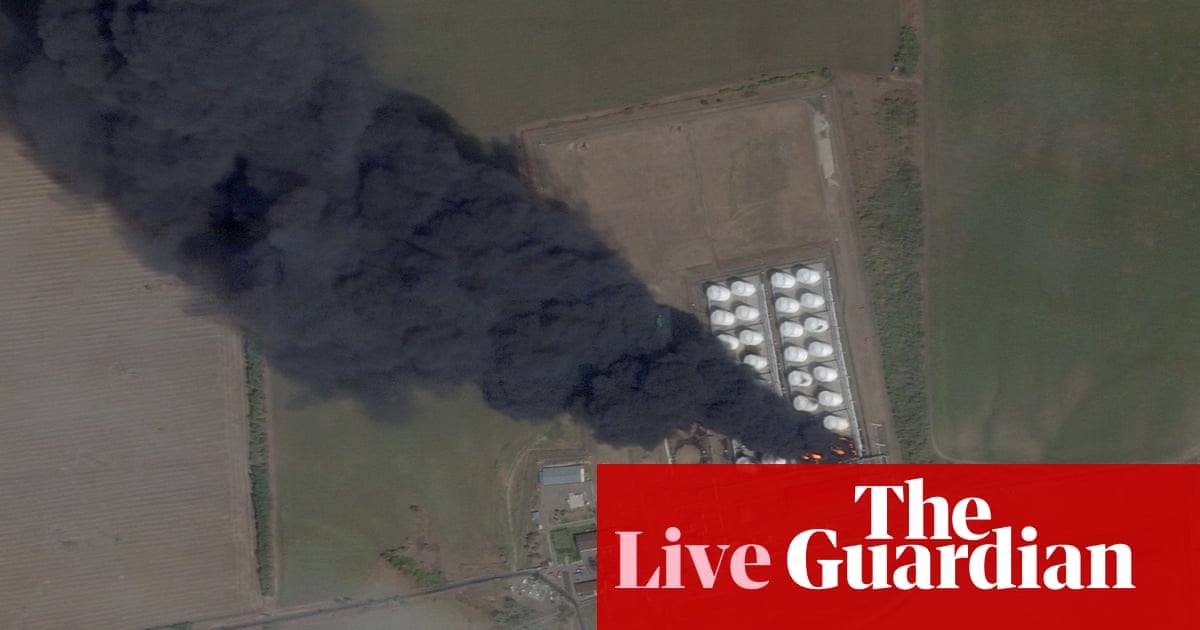Ukraine steps up calls at Brussels summit for use of western weapons inside Russia

Jennifer Rankin
Ukraine has stepped up calls for permission to use western-supplied weapons against military targets inside Russia.
Ahead of a meeting with his EU counterparts in Brussels, Ukrainian foreign minister Dmytro Kuleba said long-term security for Europe began with “short-term bold decisions for Ukraine”.
Ukraine wanted permission to use western weapons to strike “legitimate military targets” in the depths of Russia, mainly airfields used to launch bombers, he said.
“If we are supplied with a sufficient amount of missiles, if we are allowed to strike we will significantly decrease the capacity of Russia to inflict damage on our critical infrastructure and we will improve the situation for our forces on the ground.”

He was supported by the EU’s high representative for foreign policy, Josep Borrell, who described Kuleba’s meeting with 27 EU foreign ministers as an “important moment in order to make everyone understand why” restrictions should be lifted.
“The restrictions have to be lifted in order for the Ukrainans to target the places where Russia is bombing them, otherwise the weaponry is useless.”
Since the start of the war in Feb 2022, Borrell said that Russia had fired against Ukraine more than 14,000 drones, almost 10,000 missiles and “many more” glide bombs.
Key events
Russian attacks pose risk to nuclear facilities and safety of millions of people, Ukraine says
A Ukrainian mission to the International Atomic Energy Agency said in a note on Thursday: “The Russian Federation continues to deliberately target Ukraine’s energy infrastructure, intending to disrupt the operation of the country’s nuclear power plants, which provide most of Ukraine’s electricity.
“Russian attacks pose a significant risk to the stable operation of nuclear facilities in Ukraine and the safety of millions of people.”
The mission said that as a result of Monday’s attack, three out of four power units of the Rivne nuclear power plant were disconnected from the grid. Another nuclear power plant, the South Ukrainian, was forced to decrease its output.
“Due to fluctuations in the national power grid caused by Russia’s attack, at 1710 (EEST}, power unit 3 of the South Ukrainian NPP was disconnected from the grid,” the mission added.
Faced with the reality of the occupation of Russia’s territory, the state propaganda machine has sought to distract attention from the obvious military failure by focusing on government efforts to help over 130,000 residents displaced from their homes, an analyst tells AP.
State-controlled media cast the attack on Kursk as evidence of Kyiv’s aggressive intentions and more proof that Russia was justified in invading Ukraine on Feb. 24, 2022.
Tatiana Stanovaya, senior fellow at the Carnegie Russia Eurasia Center., noted that while many Kursk residents could be angry at the Kremlin, the overall nationwide sentiment could actually favor the authorities.
“While it’s certainly a blow to the Kremlin’s reputation, it is unlikely to spark a significant rise in social or political discontent among the population,” she said. “The Ukrainian attack might actually lead to a rallying around the flag and a rise in anti-Ukrainian and anti-Western sentiments.”
Russia’s Monday drone and missile attack forced Ukraine to disconnect several nuclear power units from the grid, a Ukrainian mission to the International Atomic Energy Agency said on Thursday.
The mission said in a note to the IAEA that Russia continued to target Ukraine’s energy infrastructure, intending to disrupt the operation of its nuclear power plants and posing a significant risk to the stable operation of nuclear facilities.
Ukraine steps up calls at Brussels summit for use of western weapons inside Russia

Jennifer Rankin
Ukraine has stepped up calls for permission to use western-supplied weapons against military targets inside Russia.
Ahead of a meeting with his EU counterparts in Brussels, Ukrainian foreign minister Dmytro Kuleba said long-term security for Europe began with “short-term bold decisions for Ukraine”.
Ukraine wanted permission to use western weapons to strike “legitimate military targets” in the depths of Russia, mainly airfields used to launch bombers, he said.
“If we are supplied with a sufficient amount of missiles, if we are allowed to strike we will significantly decrease the capacity of Russia to inflict damage on our critical infrastructure and we will improve the situation for our forces on the ground.”
He was supported by the EU’s high representative for foreign policy, Josep Borrell, who described Kuleba’s meeting with 27 EU foreign ministers as an “important moment in order to make everyone understand why” restrictions should be lifted.
“The restrictions have to be lifted in order for the Ukrainans to target the places where Russia is bombing them, otherwise the weaponry is useless.”
Since the start of the war in Feb 2022, Borrell said that Russia had fired against Ukraine more than 14,000 drones, almost 10,000 missiles and “many more” glide bombs.
The European Union’s top diplomat on Thursday ramped up pressure on Ukraine’s international backers to lift restrictions on the use of weapons they provide the conflict-ravaged country to allow its armed forces to strike targets inside Russia.
The U.S. restricts the use of long-range ballistic missiles it provides to Ukraine and some EU members also limit the use of their weapons. Ukraine is desperate to target airfields and other military installations inside Russia that are used to stage attacks on its armed forces and civilians.
“We need to lift restrictions on the use of weaponry against Russian military targets, in accordance with international law,” EU foreign policy chief Josep Borrell said as the bloc’s foreign ministers gathered in Brussels to discuss Russia’s invasion of Ukraine.
“The weaponry that we are providing to Ukraine has to have full use, and the restrictions have to be lifted in order for the Ukrainians to be able to target the places where Russia is bombing them. Otherwise, the weaponry is useless,” Borrell told reporters.
Several Nato countries have called for lifting restrictions on Ukraine’s use of weapons supplied by western allies, especially long-range missiles and Poland’s foreign minister, Radosław Sikorski, said that while Russia was using long-range weapons against Ukraine, allies should “let Ukraine fight with whatever it has, with whatever we have delivered them and let’s deliver them more”.
What we know about Russia’s war on Ukraine on day 918 since the invasion, at a glance, read it here:
Ukrainian air defences shot down about 15 drones launched by Russia in its third attack on the Ukrainian capital in four days, Serhiy Popko, head of Kyiv’s military administration, said on Thursday.
Drone debris damaged the windows and doors of an apartment building and caused a fire in a non-residential building which was extinguished, Popko said in a statement after the latest Russian airstrikes on Ukraine, which were mainly overnight.
Kyiv regional governor Ruslan Kravchenko said the drones caused no damage to critical infrastructure in the Kyiv region, and city and regional authorities reported no casualties.
Falling debris also caused a fire on the grounds of a private enterprise in the central region of Cherkasy and emergency services were tackling the blaze, the regional governor said.
Good morning and welcome to our blog covering the Russia-Ukraine war as it’s just reported that one civilian was killed and another two were injured in Ukrainian shelling of the town of Shebekino in Russia’s Belgorod region, governor Vyacheslav Gladkov said on Thursday. More details on that soon.
Meanwhile EU foreign ministers are gathering in Brussels for an informal meeting with Ukraine and the Middle East dominating the agenda.
Ukraine’s foreign minister, Dmytro Kuleba, is expected to attend in person to press for his country to be allowed to use western-supplied weapons on Russian territory.
In other developments:
-
Ukraine’s military has said it carried out attacks on two oil storage facilities, causing a fire on Wednesday at the Atlas oil depot in the southern Rostov region and the Zenit oil facility in Russia’s Kirov region, some 1,500 km (930 miles) northeast of the border with Ukraine.
-
Russia’s foreign ministry announced 92 additions on Wednesday to its list of Americans banned from entering the country. They include 11 current or former staff members of the Wall Street Journal — including its Editor in Chief, Emma Tucker. She had repeatedly criticised Russia for the arrest and conviction on espionage charges of WSJ reporter Evan Gershkovich, who spent 16 months behind bars before being released in August in a prisoner exchange.
-
The Ukrainian air force has said it downed two missiles and 60 drones during an overnight attack on the Ukrainian capital Kyiv, the third attack in four days.
-
Top US and Chinese officials will wrap up talks in Beijing after a third day of meetings on Thursday that were intended to ease simmering tensions between the two superpowers ahead of the US election in November. US National Security Adviser Jake Sullivan, China’s top diplomat Wang Yi and their teams gathered behind closed doors at a lush resort on the outskirts of the Chinese capital. One item on the agenda was their contrasting views over Ukraine amid China’s friendly relations with Russia.
